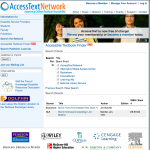 If you’ve been hanging around here at Blindgadget for any length of time, you might get the idea that we like comics. And you would be right. We love comics and so, apparently, does the National Center for Disease Control. In a rather brilliant move, the CDC has published an accessible graphic novella that illustrates the importance of emergency preparedness. Because you never know when you might find a zombie at your door (especially at this time of year!).
If you’ve been hanging around here at Blindgadget for any length of time, you might get the idea that we like comics. And you would be right. We love comics and so, apparently, does the National Center for Disease Control. In a rather brilliant move, the CDC has published an accessible graphic novella that illustrates the importance of emergency preparedness. Because you never know when you might find a zombie at your door (especially at this time of year!).
The graphic novella, Preparedness 101: Zombie Pandemic is available for download in either graphical PDF or accessible text PDF. And it’s free! The art is well done, setting a suitably eerie tone and the accessible text is nicely descriptive without unnecessary details. The story centers on a young couple and their dog settling in for a nice, normal night at home. Little do they know they have entered…the CDC Zone.
Zombies, Zombie Apocalypse, and Zombie Preparedness are all part of the CDC’s tongue in cheek campaign to engage new audiences with preparedness messages. CDC director, Dr. Ali Khan, notes, “If you are generally well equipped to deal with a zombie apocalypse, you will be prepared for a hurricane, pandemic, earthquake, or terrorist attack.” While we at Blindgadget have yet to see a hurricane or an earthquake that can be quelled with a shotgun, we are willing to accept the general validity of the metaphor.
On a fright scale of one to ten, with one being “I heard a noise in the basement” and ten being an ice cold hand gripping your ankle as you get out of bed, Preparedness 101: Zombie Pandemic gets a solid five from Blindgadget.
Source: CDC website

Follow us on Twitter, Like us on Facebook